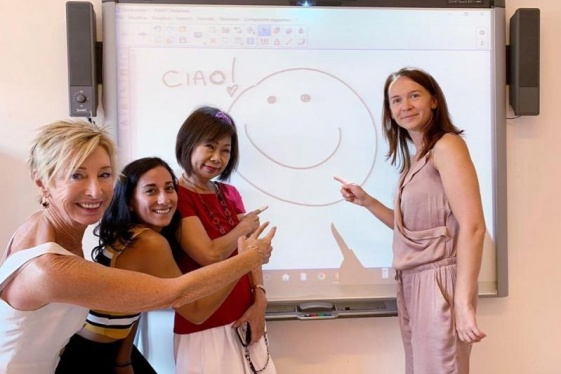

WTI Magazine #57 2015 April, 3
Author : Manuela Bianchi for learnitalygroup.com Translation by:
What is a pronoun? It is a variable part of the speech that can replace a name, an adjective or an adverb. So for example, I can say ""questo argomento è facile, quello è difficile" (this topic is easy, that one is difficult) or "questo argomento è facile, quello non lo è" (this topic is easy, that one it isn't). The subject is vast and needs to be addressed gradually.
Let's start with the easier pronouns, the possessive ones and the demonstrative ones. An Anglophone will notice one thing: in Italian the forms of possessive adjectives and possessive pronouns are identical, and this on one hand facilitates the memory but on the other hand complicates the recognition of the grammatical function. But so far, nothing is truly complicated: in the phrase "la mia idea è buona, ma la sua è migliore" (my idea is good, but his is better) we know that "mia" is an adjective and "sua" is the pronoun that replaces the word "idea".
Even the demonstrative adjectives can have a pronominal function and in phrases like "Quel libro è complicato rispetto a questo" (That book is complicated compared to this), "Questo colore è troppo scuro, quello è più chiaro" (This color is too dark, that one is clearer) we can classify "questo" (this) and "quello" (that) as two demonstrative pronouns that respectively replace the word "libro" (book) and the word "colore" (color).
"Questo" (this) and "quello" (that) are the most common forms, but we also have other demonstrative forms we use only as a pronoun. Among these we have "questi" and "quegli" which should not be confused with the plural forms of the adjectives "questo" (this) and "quello" (that). Both "questi" and "quegli" are used as a subject and refer to the singular masculine person that has already been mentioned. Between the two, "questi" is certainly more frequently used, while "quegli", maybe of a higher tone, is now very rarely used. An example can be: "Giacomo e Mario arriveranno stasera: questi è cantante, quegli professore" (Giacomo and Mario will arrive tonight: the first is a singer, the second is a professor).
Among other adjectives with just a pronominal function we can mention "ciò" which means "this thing/that thing". We can use it either as a subject in "Ciò è discutibile" (This is questionable), or as a complement in "Di ciò ne parlarono a lungo" (They talked about it for long). Other pronominal forms now fallen into disuse in our common speech are "costui", "costei", "colui", "colei", "costoro".
Nowadays we rarely use, and exclusively in the writing or in the formal register, phrases like "costei mente" (she lies), "costui ti accompagnerà" (he will go with you), "costoro affermarono" (they asserted). In their place, in common spoken and less formally written Italian we more often use demonstrative adjectives with a pronominal function or personal pronouns. So "costei" becomes "lei" (she); "costui" becomes "lui" (he); "costoro" becomes "loro" (them).
The deception of the native language
In the natural process of formation and transformation of a language, an important role is played by the phenomena of language contact. Many terms, in fact, become part of our lexicon through historical, commercial and cultural exchanges with other peoples.
Speaking of linguistic interference, let's introduce the concepts of "calco" (mold) and "prestito" (loan). The first concern semantics and represent transpositions of morphological or syntactic patterns from the language of origin to that of arrival, as with the word "grattacielo" which actually comes from the English "skyscraper".
The loans, instead, retain the shape stranger to Italian phonological rules. Obviously an ... alarm bell regarding this unfamiliarity may be the uncertainty about the pronunciation of certain words by Italian people. But there is something that is more closely about our students of Italian language, and especially the English native speakers: the formation of plurals. In today's Italian language there is a predominance of loans of English words such as "bar", "best-seller", "bus", "club", "cocktail", "computer", "audience", "big bang", "blackout", "bed and breakfast" ... just to stay among the first three letters of the alphabet.
Clearly, as actually happened in our Learn Italy Boston school, the problem of an Anglophone student will never be the correct pronunciation of a word taken from his idiom: the problem can be the use made in Italian of that word. For example, let us mention the mistake of our Boston student: he said "I leaders dei paesi si sono riuniti" (the leaders of the countries have met). In Italian the word "Leader" is invariable, as well as the other words coming from the English language: so you'll never add the letter "s" at the end of it, even if you are referring to more than one. It may seem bizarre to be corrected in using a word from our own language, but this little tip can help those who aspire to have an advanced level of Italian.
You may be interested
-
Italian world language teacher 2015-2016
FRAMINGHAM PUBLIC SCHOOLS - JOB DESCRIPTION TITLE: World Language Teacher - Italian...
-
'Italy Stay Strong': What The Coronavirus Eme...
On the northern coast of Sicily, looking out toward the magnificent Aeolian Islands, Milaz...
-
‘Carnivale’ doubles as event to persuade YSU...
Lent begins next Wednesday but the Italian community of Youngstown celebrated their own Ma...
-
‘Il Canto degli Italiani’: What the Italian n...
The Italian football team and its fans are known for belting out rousing renditions of the...
-
‘In Other Words’ review: Jhumpa Lahiri’s love...
By Howard Norman Jhumpa Lahiri lived with her family in Rome in 2012. Though she...
-
‘Let’s Choose Three Words’: the Project dedic...
‘Let’s Choose Three Words’ is a new educational project promoted by the Ministry of Foreig...
-
‘Living in Rome’ talk accompanies Italian din...
An Italian Dinner and Talk on "Living in Rome: Duties, Distractions and Delights" will be...
-
‘Sons’ save Primavera program
A community program providing supplemental education in a foreign language to community ch...










